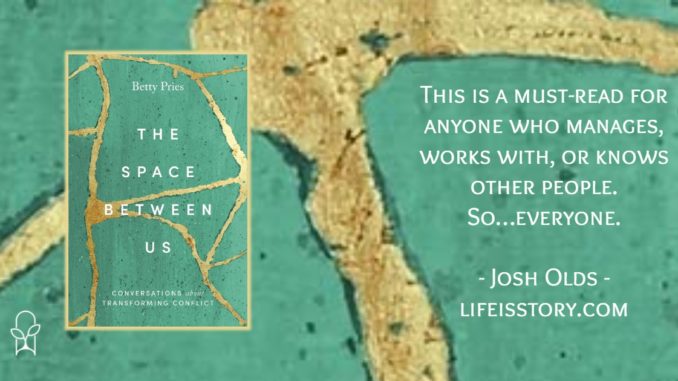
Published by Herald Press on August 17, 2021
Genres: Non-Fiction, Christian Life
Buy on Amazon
Goodreads

Engage conflict to strengthen connections and build understanding. Conflict is inevitable. But rather than approaching conflicts as threats or problems to be solved, what if we could see our disagreements as opportunities for personal growth? Could our differences push us toward developing healthier relationships and communities? In The Space Between Us, facilitator and mediator Betty Pries gently guides readers toward seeing discord as an opportunity for positive change and a way to build resilience. Rooted in the conviction that conflict can strengthen our relationships and deepen our self-knowledge, Pries offers practical skills for engaging conflict and casts a vision for a more joy-filled future. To get here, Pries plumbs the depth of both conflict theory and contemplative spirituality, proposing a vision for engaging conflict in new and life-giving ways. Rooted in Christian practices of mindfulness, connecting with our most authentic selves, and deep listening to uncover new possibilities, this book offers new ways forward in the face of interpersonal and organizational conflicts.
The world is a rather tense place. From the way we talk about politics to the way we treat service workers, there seems to have been an influx of conflict—and not just disagreements but disagreements handled poorly. In The Space Between Us, Betty Pries uses her experience as a workplace mediator to teach readers how to transform conflict into positive change and resilience.
Pries begins with a careful definition of terms and a categorical belief that conflict can be good. She writes about how fear of conflict can create a false sense of peace and harmony that keeps individuals from being their true selves. While she has the workplace in mind, and many of her relevant examples stem from that environment, the lessons learned can be applied in any context to any social interaction.
From here, The Space Between Us turns to an individual’s foundational needs (and their violation) as a source of conflict. Every individual desires belonging, recognition, self-determination, security, and meaning. Conflict comes from one of those needs not being met (or perceived to have been met) in some way. Pries also categorizes levels of conflict:
- Disagreement – The problem is the problem and the goal is to solve the problem.
2a. Us/Them Division – The person is the problem and the goal is to change their mind.
2b. Triangulation – The goal is to be affirmed for one’s perspective of the other as the problem.
2c. The Tipping Point – The goal becomes self-preservation.
- Entrenchment – The goal is now to destroy the other.
Notice how the problem disappeared from the conflict in 2a. The problem remains, but no work is done in solving it because the conflict has become focused on the other person.
In the middle part of the book, The Space Between Us teaches readers how to develop strategies and best practices for conflict resolution and management. Some of the selected examples seem geared specifically to be contentious, challenging the reader to put into practices the things they are working toward. Along the way, Pries shows that her techniques apply to everything from small disagreements to major political differences.
As the book closes, Pries ties together conflict resolution—or conflict transformation—with spiritual practices, focusing on prayer and meditation as a means of mitigating conflict. I appreciated the way the spiritual element was included as a method of enhancing the technique and bringing a certain wholeness to it, without being essential to it. Essential may not be the right word, and I want to be careful to explain correctly. The point is that many books on conflict from Christians are almost fully geared to the spiritual element with an implicit (or explicit!) assumption that conflict management can only happen under Christian faith. The Space Between Us offers techniques and practices that are biblical, but not necessary spiritual. You could just as easily apply this to a non-Christian worldview as a Christian one, which is important for the context of a secular workplace.
This is a must-read for anyone who manages, works with, or knows other people. So…everyone. Pries explains the roots of conflict, teaches us how to disagree, and gives us a paradigm for turning disagreement into positive change.
